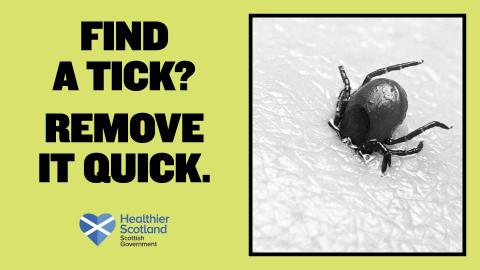People in Scotland are being encouraged to enjoy the outdoors safely this summer by taking precautions against tick bites and being aware of the symptoms of Lyme disease.
Lyme disease is a bacterial infection that can be spread to humans by infected ticks. It is usually mild, but can be serious if not treated early, so it’s important to know the dangers and act quickly if bitten.
Ticks can be found throughout Scotland in wooded and grassy areas, so taking preventative measures when outdoors, such as sticking to pathways instead of going through long grass, using a repellent spray on clothing and not exposing skin can help reduce the risk of being bitten.
Professor of Molecular Microbiology for the University of Glasgow, Tom Evans, reinforced that prevention is key to reducing the risk of serious infection: “Ticks are in peak season in summer, and with people spending more time outdoors it’s important that they take steps to prevent becoming ill from Lyme disease.
“If you do get bitten, you should remove the tick as soon as possible to prevent infection. Using fine-tipped tweezers to gently grip the tick as close to the skin as possible, pull it steadily away from the skin without twisting or crushing it. Special tick removers are also available from most pharmacies. You should wash the area with water and soap afterwards and apply an antiseptic cream.”
He also highlighted the importance of recognising the early symptoms of Lyme disease, which include a red circular rash on the skin, often described as looking like a bullseye on a dart board, and cold or flu-like symptoms such as tiredness, headaches and muscle or joint pain. “Lyme disease can be difficult to detect, and while most cases are mild, if not found early it can have serious and lifelong side effects. Therefore it’s really important to be aware of any symptoms in the weeks following a tick bite so it can be effectively treated.”
If you do have any of these symptoms, you should see your GP or visit nhsinform.scot/lyme-disease for more information.
For more tips on how to prevent tick bites when out and about this summer, visit nhsinform.scot/Iyme-disease

